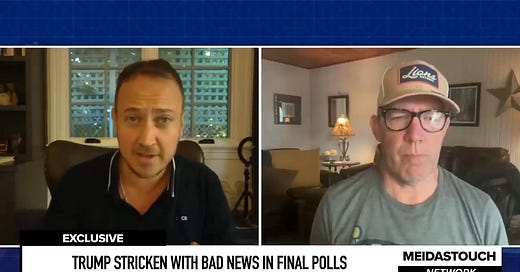In a recent interview with MeidasTouch, veteran political strategist and former Bush-Cheney chief strategist Matthew Dowd broke down the 2024 election landscape, offering insights into the factors shaping the final days of the race. Dowd, known for his deep understanding of both Democratic and Republican campaigns, shared data-backed perspectives on polling stability, early voting patterns, and the potential impact of recent controversies surrounding Donald Trump.
At the outset, Dowd addressed the consistent 2-3 point national lead Vice President Kamala Harris has held over Donald Trump, based on the latest nonpartisan polling. Despite the media’s focus on “junk polls” skewing perceptions, Dowd emphasized that stable data consistently points to Harris maintaining a narrow but resilient edge. “This race has been about a three-point race for two months,” Dowd said, “and it’s not changed that much, despite the media’s fixation on certain things.” Cautioning against outlier data, he underscored that Harris’s advantage is reflected both nationally and within key battleground states.
One of Dowd’s more surprising predictions involved North Carolina. Dowd cited early voting data showing Harris potentially holding a lead, suggesting that Republicans may be underestimating the depth of anti-Trump sentiment even among traditionally Republican voters. “I think she squeaks out North Carolina, which will be a huge signal to Republicans,” Dowd said, explaining that a Harris win there would indicate a “political realignment” in favor of pro-democracy coalitions over MAGA-aligned Republicanism, which does not represent traditional conservatism.
Throughout the interview, Dowd dispelled misconceptions about early voting trends, particularly the assumption that higher Republican early turnout directly benefits Trump. “A lot of it is cannibalized votes—Republicans moving their Election Day votes to early voting,” he noted. Dowd warned against drawing premature conclusions, particularly in states like Nevada, where early Republican turnout has been emphasized but may not predict final results. Instead, he urged viewers to look at turnout shifts in the final days, referencing how Democratic voters, particularly independents, can create last-minute shifts that surprise media narratives.
Dowd also highlighted two recent controversies as potentially demotivating Trump’s base. First, retired General John Kelly’s stark criticism of Trump as a “fascist” reignited scrutiny of Trump’s authoritarian tendencies. Second, Trump’s ill-received event at Madison Square Garden that further polarized voters. Dowd explained that these incidents could drive away moderate suburban voters and people of color, stating, “When he calls one group out, they know he feels the same way about their group.” These stories, Dowd said, risk deepening the divide within Trump’s base and pushing moderates toward Harris.
Looking ahead to the final week, Dowd urged voters to “run through the tape” by staying engaged in mobilizing and voting efforts. He warned that Trump’s recent stumbles could have lasting consequences, citing his record of campaign mismanagement, and pointed to the importance of maintaining voter motivation to secure a Harris win. Dowd’s closing advice to viewers was clear: “It’s okay to worry, but it’s not okay to sit in anxiety. Just do the work.”
In a campaign season marked by polling uncertainty and unexpected events, Dowd’s insights offer a reminder of the steady momentum within the Harris camp—and of how each remaining day of the race could determine the country’s future.
We are offering this interview to you ad-free here on Meidas+. If you appreciate our work, please consider becoming a paid subscriber today and help support independent media.
















Share this post